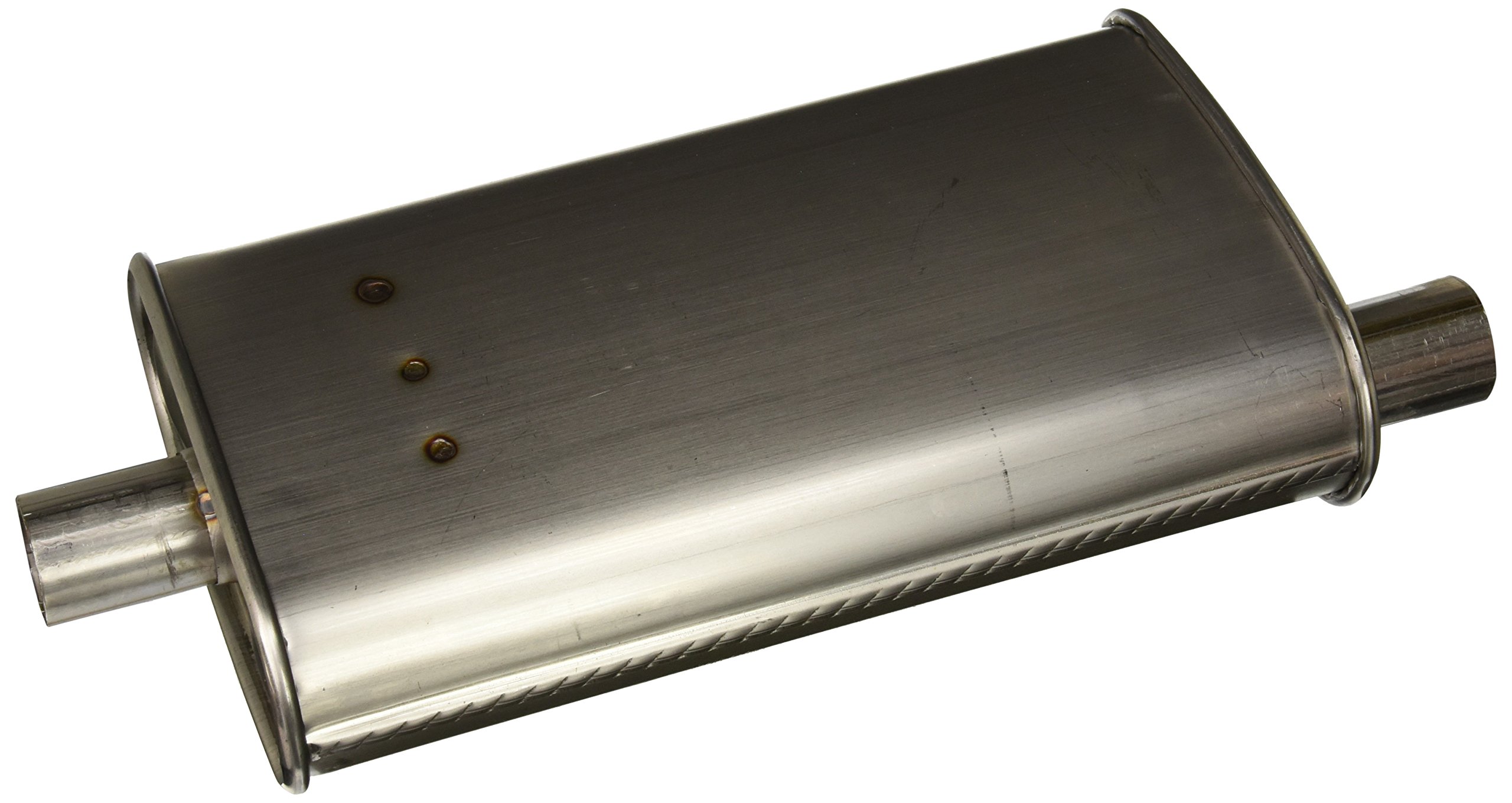A quieter muffler for a generator is available in the form of the Gen Silencer, an American-made portable generator silencer that effectively reduces exhaust noise. Many people opt to install a larger replacement muffler on their generator to minimize noise output.
Quietest Generator Muffler Selection
Find the best selection of quietest generator mufflers to reduce noise levels. Choose from various options for easy installation and efficient noise reduction. Improve your generator’s performance without compromising on tranquility.
Understanding The Importance Of Low Noise
When it comes to selecting a generator muffler, understanding the importance of low noise is essential. A quiet generator offers numerous benefits, including minimizing noise pollution and providing a peaceful environment for both indoor and outdoor activities. Whether you need to power your RV, run essential appliances during a power outage, or work on construction sites, having a generator with a quiet muffler can make a significant difference in your experience.
Decibel Reduction Techniques
Decibel reduction techniques are crucial in selecting the quietest generator muffler. Mufflers with advanced silencing technology use insulation, baffle design, and sound-absorbing materials to minimize noise levels. These techniques help in reducing generator noise by directing exhaust gas flow and suppressing high-frequency sound waves. When exploring various muffler options, keep an eye out for decibel reduction specifications to choose a muffler that guarantees a significant noise reduction for your generator.
Accessibility Of Muffler Upgrades
Upgrading your generator’s muffler is a simple and effective way to achieve a quieter operation. Fortunately, many aftermarket muffler options are available, designed specifically to fit various generator models. These mufflers often come with installation instructions and can be easily replaced without the need for professional assistance. With the accessibility of muffler upgrades, it’s now easier than ever to transform your noisy generator into a quiet powerhouse.
In conclusion, selecting the quietest generator muffler is an important decision to ensure a noise-free and enjoyable experience. Understanding the importance of low noise, exploring decibel reduction techniques, and taking advantage of accessible muffler upgrades are key factors to consider. With the right muffler, you can power your generator without disturbing anyone around you and create a peaceful environment for all your activities.
Assessing Muffler Performance
When it comes to generator mufflers, assessing their performance is crucial in ensuring a quieter operation. A high-quality muffler can significantly reduce noise levels, making it more pleasant for both you and your neighbors. In this section, we will explore how to evaluate muffler noise levels, performance metrics for silent operation, and how to compare different muffler brands.
Evaluating Muffler Noise Levels
Evaluating muffler noise levels is an essential step in determining the effectiveness of a generator muffler. To assess the noise reduction capabilities of a muffler, consider the following:
- Decibel (dB) ratings: Look for mufflers with lower dB ratings, as they indicate quieter operation.
- Sound deadening material: Check if the muffler is equipped with sound deadening materials like acoustic foam or insulation, which can help absorb and reduce noise.
- Installation design: Consider mufflers that are designed to minimize exhaust noise, such as those with baffles or resonance chambers.
Performance Metrics For Silent Operation
To achieve silent operation, consider the following performance metrics when evaluating a generator muffler:
- Noise reduction: The primary goal of a generator muffler is to reduce noise levels. Look for mufflers that boast significant noise reduction capabilities.
- Fuel efficiency: A high-quality muffler should not impede the generator’s fuel efficiency. Ensure that the muffler does not cause excessive backpressure, which can lead to decreased fuel efficiency.
- Engine performance: The muffler should not hinder the engine’s performance or cause any disruptions in operation. It should provide proper ventilation and exhaust flow.
Comparing Muffler Brands
When comparing different muffler brands, consider the following factors:
- Noise reduction capabilities: Compare the dB ratings and noise reduction claims of various muffler brands to determine which one offers the quietest operation.
- Customer reviews: Read feedback from customers who have used the muffler, paying attention to their experiences regarding noise reduction, ease of installation, and overall satisfaction.
- Price and quality: Assess the price and quality of different muffler brands to find a balance between affordability and performance.
Silent Exhaust Implementation
When it comes to generator mufflers, one of the key factors to consider is the silent exhaust implementation. A quiet generator not only ensures a peaceful environment but also reduces noise pollution. Strategic installation of a muffler can significantly contribute to maximum quietness, allowing you to enjoy the benefits of your generator without the disturbing noise. In this section, we will discuss the steps and tools required for a successful silent exhaust implementation.
Strategic Installation For Maximum Quietness
Installing a generator muffler strategically is crucial for achieving maximum quietness. By following the steps outlined below, you can effectively reduce the noise emitted by your generator:
Tools And Equipment Needed
Before beginning the installation process, it is important to gather the necessary tools and equipment. The following items are required for a successful silent exhaust implementation:
| Tools and Equipment |
|---|
| Generator muffler |
| Exhaust pipe |
| Clamps |
| Hangers |
| Wrench |
| Hacksaw |
| Measuring tape |
| Safety gloves |
| Eye protection |
Step-by-step Installation Guide
- Start by measuring the existing exhaust pipe and muffler to determine the required length for the new muffler.
- Using a hacksaw, carefully cut the exhaust pipe to the desired length.
- Attach the new muffler to the exhaust pipe, ensuring a secure fit.
- Use clamps and hangers to secure the muffler to the generator frame, keeping it in place.
- Double-check all connections to ensure they are tight and leak-free.
- Put on safety gloves and eye protection to protect yourself during the installation process.
- Start the generator and monitor the noise level. Make any necessary adjustments to optimize the quietness.
By following this step-by-step installation guide and using the appropriate tools and equipment, you can implement a silent exhaust system for your generator and enjoy a quieter environment.

Credit: bb-rv.com
Enhancing Generator Silence
Enhance the silence of your generator with the Quietest Generator Muffler. This muffler is designed to reduce noise and make your generator run quietly. Say goodbye to the annoying generator noise and enjoy a peaceful environment.
When it comes to generators, noise can be a major concern. The constant humming can disrupt the peace and quiet of any environment. That’s why it’s essential to find ways to enhance the silence of your generator. In this article, we’ll explore advanced muffler technologies, soundproofing additions beyond mufflers, and how to maintain performance while reducing noise.
Advanced Muffler Technologies
One of the most effective ways to reduce generator noise is through the use of advanced muffler technologies. These mufflers are designed to minimize noise without compromising the generator’s performance. They are constructed with sound-absorbing materials and innovative designs that help to dampen the sound waves generated by the engine.
- Noise-Canceling Mufflers: These mufflers use advanced internal chambers and baffles to cancel out specific sound frequencies, resulting in a quieter operation.
- Resonator Mufflers: Resonator mufflers use a tuned resonator chamber to redirect and dissipate the exhaust sound waves, effectively reducing noise levels.
- Expansion Chamber Mufflers: Expansion chamber mufflers utilize a series of expanding chambers to decrease noise by slowing down and redirecting the exhaust gases.
Investing in a generator with these advanced muffler technologies can significantly enhance the silence of your generator.
Soundproofing Additions Beyond Mufflers
If you’re looking for additional ways to make your generator even quieter, there are soundproofing additions you can consider beyond just mufflers. These additions work in conjunction with advanced muffler technologies to further reduce noise levels.
- Acoustic Foam Insulation: Applying acoustic foam insulation to your generator’s housing can absorb sound waves, preventing them from escaping and reducing noise levels.
- Vibration Pads: Placing vibration pads under your generator can help reduce noise caused by vibrations, resulting in a quieter operation.
- Generator Enclosures: Investing in a generator enclosure can provide an extra layer of soundproofing by enclosing the generator and reducing noise leakage.
By incorporating these soundproofing additions along with advanced muffler technologies, you can create a much quieter generator.
Maintaining Performance While Reducing Noise
While it’s essential to enhance the silence of your generator, it’s equally important to maintain its performance. After all, a quiet generator is only beneficial if it can still power your appliances and equipment effectively. Fortunately, there are ways to reduce noise without sacrificing performance.
Here are some tips to maintain performance while reducing noise:
- Regular Maintenance: Keep your generator well-maintained by following the manufacturer’s recommended maintenance schedule. This ensures optimal performance while minimizing excessive noise caused by wear and tear.
- Proper Placement: Position your generator in a well-ventilated area to prevent overheating and maintain optimal performance. Avoid placing it too close to walls or other objects that may obstruct airflow.
- Use Inverter Generators: Inverter generators are known for their quieter operation compared to traditional generators. They utilize advanced technology to adjust the engine speed based on power demand, resulting in less noise.
By following these tips, you can strike a balance between reducing noise and maintaining the performance of your generator.
Sustaining Muffler Efficiency
When it comes to ensuring a peaceful and noise-free environment while operating a generator, a reliable and efficient muffler is essential. The muffler plays a crucial role in reducing the noise produced by the generator engine, allowing you to enjoy the power supply without any disturbing sounds. However, just like any other component, the muffler requires regular maintenance and occasional troubleshooting to sustain its efficiency. In this post, we will explore the importance of maintaining silent exhaust systems, common issues that may arise with silent mufflers, and ways to upgrade for future noise reduction needs.
Regular Maintenance Of Silent Exhaust Systems
To keep your silent exhaust system functioning optimally, regular maintenance is key. Here are some essential maintenance tasks to ensure the efficiency of your silent muffler:
- Clean the muffler: Over time, the muffler can accumulate dirt, debris, and soot, which can hinder its performance. Regularly clean the muffler using a soft brush and mild detergent to remove any buildup that may be restricting airflow.
- Inspect for leaks: Check for any signs of leaks in the muffler, such as cracks or holes. These leaks can negatively impact the noise reduction capability of the muffler. If you notice any leaks, it is important to repair or replace the muffler promptly.
- Replace damaged parts: If any components of the muffler are damaged or worn out, such as the exhaust pipe or baffles, ensure they are replaced with high-quality parts to maintain the efficiency of the muffler.
- Check for blockages: Inspect the muffler for any blockages, such as debris or insects. Blocked mufflers can cause backpressure, leading to reduced exhaust flow and increased noise levels.
Troubleshooting Common Silent Muffler Issues
Even with regular maintenance, silent mufflers might encounter some issues. Here are a few common problems you may encounter and some troubleshooting steps:
- Excessive noise: If your silent muffler is not effectively reducing the noise produced by the generator, consider checking for leaks, loose connections, or damaged components. Rectifying these issues should help restore the muffler’s noise reduction efficiency.
- Poor performance: If you notice a decrease in the performance of your silent muffler, it could be due to a clogged or dirty muffler. Cleaning or replacing the muffler, as mentioned earlier, can help restore its efficiency.
- Unusual vibrations: Excessive vibrations can indicate loose or damaged parts within the muffler assembly. Tighten any loose connections or consider replacing damaged components to eliminate the vibrations and restore the muffler’s functionality.
Upgrading For Future Noise Reduction Needs
As technology advances and noise reduction standards evolve, it is important to stay ahead of the curve and upgrade your silent muffler to meet future noise reduction needs. Consider the following options for upgrading your generator muffler:
- High-performance mufflers: Upgrade your silent muffler to a high-performance model that offers better noise reduction capabilities. These mufflers are designed with advanced materials and innovative engineering techniques to provide superior noise reduction.
- Noise reduction accessories: Supplement your existing muffler with noise reduction accessories, such as silencer boxes or sound-absorbing materials. These accessories work in conjunction with the muffler to further reduce noise levels.
- Consult a professional: If you are unsure about which upgrade option is best for your generator, consult a professional in the field of silent mufflers. They can assess your specific noise reduction needs and recommend the most suitable upgrade solution.
In conclusion, sustaining muffler efficiency is crucial when it comes to enjoying a quiet and peaceful generator operation. By performing regular maintenance, troubleshooting common issues, and upgrading for future noise reduction needs, you can ensure your silent muffler continues to provide optimal noise reduction, allowing you to enjoy the benefits of your generator without any disturbance.
Frequently Asked Questions Of Quietest Generator Muffler
Is There A Quiet Muffler For A Generator?
Yes, there are quiet mufflers available for generators. Installing a larger replacement muffler can help reduce the noise coming from the generator’s exhaust pipes. Another option is to use a generator silencer or exhaust extension silencer kit for quieter operation.
Can I Put A Better Muffler On My Generator?
Yes, you can put a better muffler on your generator to reduce noise. A larger replacement muffler can help muffle the sound coming out of the exhaust pipes attached to the generator’s motor. This is a popular strategy used to make generators quieter.
How Can I Make My Noisy Generator Quieter?
Here’s how to make your noisy generator quieter: Install a larger replacement muffler to muffle the sound coming out of the exhaust pipes attached to the generator’s motor. This is a popular strategy to reduce noise.
How Many Decibels Is The Quietest Generator?
The quietest generator typically produces around 50-60 decibels of noise.
Conclusion
Finding the quietest generator muffler is essential for reducing the noise emitted by your generator. By installing a larger replacement muffler or using a generator exhaust silencer box, you can effectively muffle the sound and enjoy a quieter generator experience.
Consider options like the Gen Silencer or the Easy Install Exhaust Silencer for Generators for a more peaceful and pleasant environment. Say goodbye to the disruptive noise and enjoy the benefits of a quieter generator.

I am a Water Heater specialist writer and blogger based in the USA & UK. I have been working with Water Heater for six long years. And I give trips on various Water Heater problems and solutions. I have a lot of experience with Water Heater And I share them here

